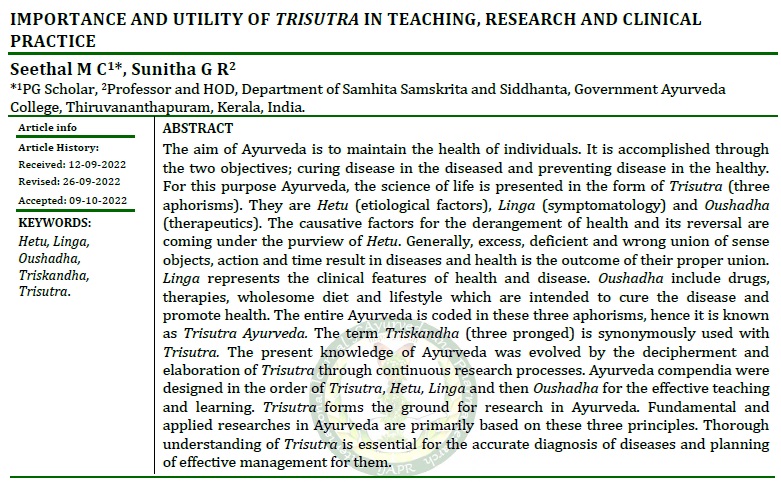Importance and Utility of Trisutra in Teaching, Research and Clinical Practice
Abstract
The aim of Ayurveda is to maintain the health of individuals. It is accomplished through the two objectives; curing disease in the diseased and preventing disease in the healthy. For this purpose Ayurveda, the science of life is presented in the form of Trisutra (three aphorisms). They are Hetu (etiological factors), Linga (symptomatology) and Oushadha (therapeutics). The causative factors for the derangement of health and its reversal are coming under the purview of Hetu. Generally, excess, deficient and wrong union of sense objects, action and time result in diseases and health is the outcome of their proper union. Linga represents the clinical features of health and disease. Oushadha include drugs, therapies, wholesome diet and lifestyle which are intended to cure the disease and promote health. The entire Ayurveda is coded in these three aphorisms, hence it is known as Trisutra Ayurveda. The term Triskanda (three pronged) is synonymously used with Trisutra. The present knowledge of Ayurveda was evolved by the decipherment and elaboration of Trisutra through continuous research processes. Ayurveda compendia were designed in the order of Trisutra, Hetu, Linga and then Oushadha for the effective teaching and learning. Trisutra forms the ground for research in Ayurveda. Fundamental and applied researches in Ayurveda are primarily based on these three principles. Thorough understanding of Trisutra is essential for the accurate diagnosis of diseases and planning of effective management for them
Downloads

Copyright (c) 2022 International Journal of Ayurveda and Pharma Research

This work is licensed under a Creative Commons Attribution-NonCommercial-ShareAlike 4.0 International License.






